2017年中考英语简单句考点
- 格式:doc
- 大小:99.00 KB
- 文档页数:26
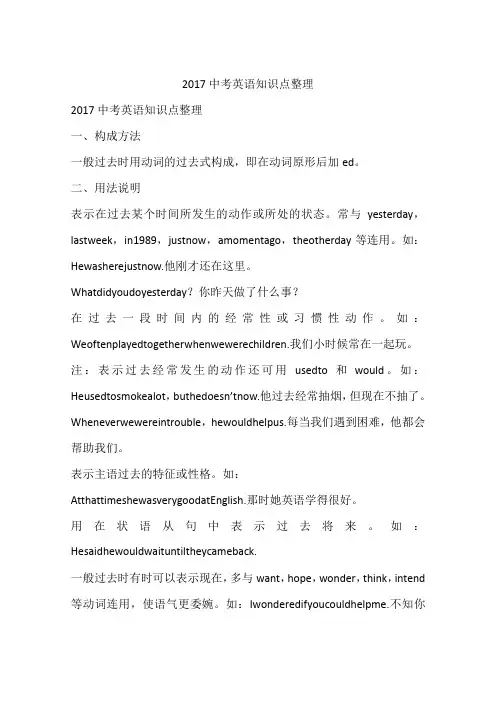
2017中考英语知识点整理2017中考英语知识点整理一、构成方法一般过去时用动词的过去式构成,即在动词原形后加ed。
二、用法说明表示在过去某个时间所发生的动作或所处的状态。
常与yesterday,lastweek,in1989,justnow,amomentago,theotherday等连用。
如:Hewasherejustnow.他刚才还在这里。
Whatdidyoudoyesterday?你昨天做了什么事?在过去一段时间内的经常性或习惯性动作。
如:Weoftenplayedtogetherwhenwewerechildren.我们小时候常在一起玩。
注:表示过去经常发生的动作还可用usedto和would。
如:Heusedtosmokealot,buthedoesn’tnow.他过去经常抽烟,但现在不抽了。
Wheneverwewereintrouble,hewouldhelpus.每当我们遇到困难,他都会帮助我们。
表示主语过去的特征或性格。
如:AtthattimeshewasverygoodatEnglish.那时她英语学得很好。
用在状语从句中表示过去将来。
如:Hesaidhewouldwaituntiltheycameback.一般过去时有时可以表示现在,多与want,hope,wonder,think,intend 等动词连用,使语气更委婉。
如:Iwonderedifyoucouldhelpme.不知你能不能帮我一下。
有时用一般过去时也是时态一致的需要。
如:Ididn’tknowyouwerehere.没想到你在这里。
注意:1.表示一系列的动作,尽管有先后,都用一般过去时,最后两个动词之间用and连结。
如:Heopenedthedoor,rushedoutandthendisappeared.他打开门,冲了出去,然后就消失了。
2.注意在语境中理解“我刚才/原来还不……”。
如:—Yourphonenumberagain?Ididn’tquitecatchit.—It’s2566666.请再说一次你的电话号码,好吗?我刚才没听清楚。
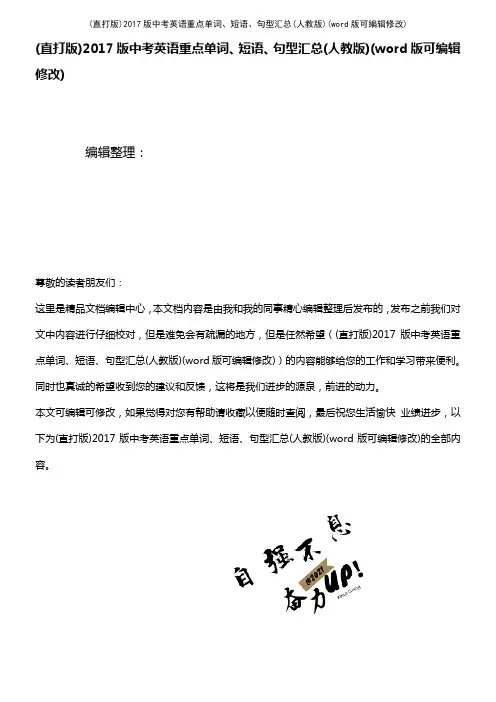
(直打版)2017版中考英语重点单词、短语、句型汇总(人教版)(word版可编辑修改)编辑整理:尊敬的读者朋友们:这里是精品文档编辑中心,本文档内容是由我和我的同事精心编辑整理后发布的,发布之前我们对文中内容进行仔细校对,但是难免会有疏漏的地方,但是任然希望((直打版)2017版中考英语重点单词、短语、句型汇总(人教版)(word版可编辑修改))的内容能够给您的工作和学习带来便利。
同时也真诚的希望收到您的建议和反馈,这将是我们进步的源泉,前进的动力。
本文可编辑可修改,如果觉得对您有帮助请收藏以便随时查阅,最后祝您生活愉快业绩进步,以下为(直打版)2017版中考英语重点单词、短语、句型汇总(人教版)(word版可编辑修改)的全部内容。
中考必背单词、短语、句型第(一)讲7上 Starter 1~4一、必背单词Starter Units 1~3 1.morning n.早晨;上午2.afternoon n.下午3.evening n.晚上;傍晚4.how adv。
怎样;如何5.fine adj. 健康的;美好的6.thanks interj。
& n.感谢;谢谢7.map n。
地图8.cup n. 杯子9.ruler n。
尺;直尺10.English n.英语adj. 英格兰的;英语的11.orange n.橙子12.jacket n.夹克衫;短上衣13.spell v。
用字母拼;拼写14.please interj。
请15.colo(u)r n.颜色16.red adj. & n. 红色(的)17.yellow adj。
& n. 黄色(的)18.green adj。
& n。
绿色(的)19.blue adj。
&n。
蓝色(的)20.black adj。
&n. 黑色(的)21.white adj. &n。
白色(的) 22.purple adj. &n。
紫色(的) 23.brown adj. &n. 棕色(的);褐色(的)Unit 1 24.name n.名字,名称25.nice adj。
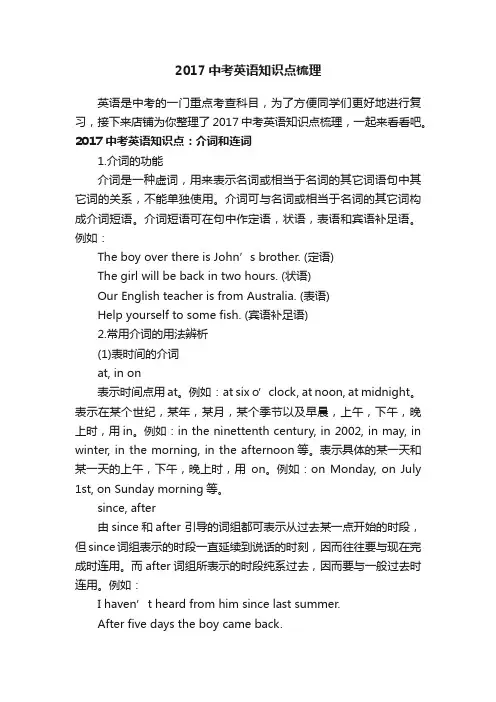
2017中考英语知识点梳理英语是中考的一门重点考查科目,为了方便同学们更好地进行复习,接下来店铺为你整理了2017中考英语知识点梳理,一起来看看吧。
2017中考英语知识点:介词和连词1.介词的功能介词是一种虚词,用来表示名词或相当于名词的其它词语句中其它词的关系,不能单独使用。
介词可与名词或相当于名词的其它词构成介词短语。
介词短语可在句中作定语,状语,表语和宾语补足语。
例如:The boy over there is John’s brother. (定语)The girl will be back in two hours. (状语)Our English teacher is from Australia. (表语)Help yourself to some fish. (宾语补足语)2.常用介词的用法辨析(1)表时间的介词at, in on表示时间点用at。
例如:at six o’clock, at noon, at midnight。
表示在某个世纪,某年,某月,某个季节以及早晨,上午,下午,晚上时,用in。
例如:in the ninettenth century, in 2002, in may, in winter, in the morning, in the afternoon等。
表示具体的某一天和某一天的上午,下午,晚上时,用on。
例如:on Monday, on July 1st, on Sunday morning等。
since, after由since和after 引导的词组都可表示从过去某一点开始的时段,但since词组表示的时段一直延续到说话的时刻,因而往往要与现在完成时连用。
而after词组所表示的时段纯系过去,因而要与一般过去时连用。
例如:I haven’t heard from him since last summer.After five days the boy came back.in, afterin与将来时态连用时,表示“过多长时间以后”的意思,后面跟表示一段时间的词语。
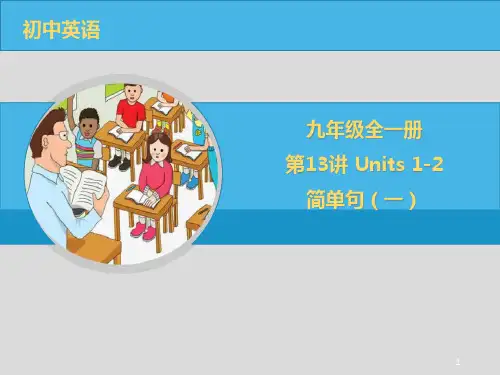
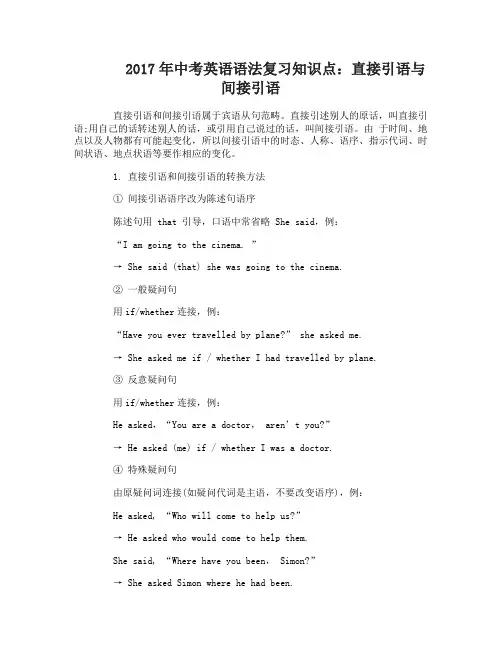
2017年中考英语语法复习知识点:直接引语与间接引语直接引语和间接引语属于宾语从句范畴。
直接引述别人的原话,叫直接引语;用自己的话转述别人的话,或引用自己说过的话,叫间接引语。
由于时间、地点以及人物都有可能起变化,所以间接引语中的时态、人称、语序、指示代词、时间状语、地点状语等要作相应的变化。
1. 直接引语和间接引语的转换方法① 间接引语语序改为陈述句语序陈述句用 that 引导,口语中常省略 She said,例:“I am going to the cinema. ”→ She said (that) she was going to the cinema.② 一般疑问句用if/whether连接,例:“Have you ever travelled by plane?” she asked me.→ She asked me if / whether I had travelled by plane.③ 反意疑问句用if/whether连接,例:He asked,“You are a doctor,aren’t you?”→ He asked (me) if / whether I was a doctor.④ 特殊疑问句由原疑问词连接(如疑问代词是主语,不要改变语序),例:He asked, “Who will come to help us?”→ He asked who would come to help them.She said, “Where have you been,Simon?”→ She asked Simon where he had been.⑤选择疑问句由whether…or 引导,例:Eddie said, “Is this a TV set or a computer?”→ Eddie asked (me) whether that was a TV set or a computer.⑥ 祈使句用“tell /ask /order someone (not) to do something” 结构,将动词原形变为动词不定式,例:“Put up your hands,” said the teacher.→ The teacher told them to put up their hands.“Don’t play football on the street,” the policeman said.→ The policeman ordered us not to play football on the street.2017年中考英语语法复习知识点:名词Part 1(1)有些物质名词在表达可数概念时,可转化为可数名词如:wind 风— a wind 一阵(场)风 tea 茶— a tea 一杯茶fruit 水果—fruits 各种各样的水果总结:除了上面所列举的例子外,还有以下单词在表达个体概念时,时常可数:snow — a snow coffee — a coffee beer— a beerfood — a food glass — a glass (一个玻璃杯) glasses (眼睛,玻璃杯)(2)有些不可数名词的复数形式具有特殊含义rains 大量的雨水,多场雨 snows 大量的雪,多场雪winds 多场风 waters 大片水域 sands 沙堆,沙丘Part 2抽象名词表示具体事物时,可以变成可数名词,表示某种人或某件事。
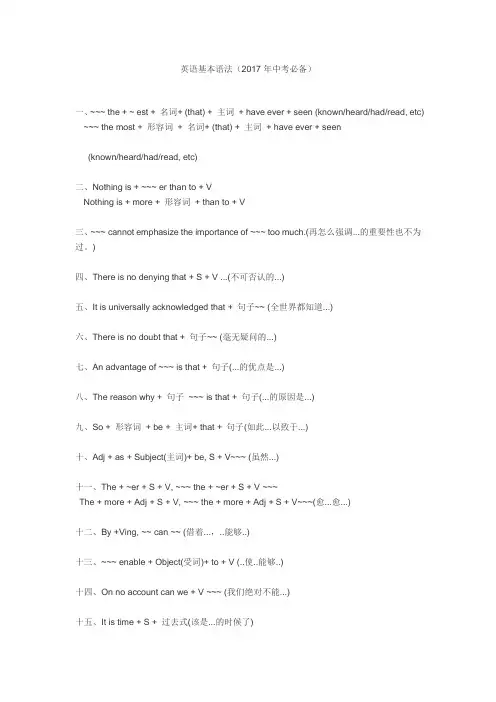
英语基本语法(2017年中考必备)一、~~~ the + ~ est + 名词+ (that) + 主词+ have ever + seen (known/heard/had/read, etc) ~~~ the most + 形容词+ 名词+ (that) + 主词+ have ever + seen(known/heard/had/read, etc)二、Nothing is + ~~~ er than to + VNothing is + more + 形容词+ than to + V三、~~~ cannot emphasize the importance of ~~~ too much.(再怎么强调...的重要性也不为过。
)四、There is no denying that + S + V ...(不可否认的...)五、It is universally acknowledged that + 句子~~ (全世界都知道...)六、There is no doubt that + 句子~~ (毫无疑问的...)七、An advantage of ~~~ is that + 句子(...的优点是...)八、The reason why + 句子~~~ is that + 句子(...的原因是...)九、So + 形容词+ be + 主词+ that + 句子(如此...以致于...)十、Adj + as + Subject(主词)+ be, S + V~~~ (虽然...)十一、The + ~er + S + V, ~~~ the + ~er + S + V ~~~The + more + Adj + S + V, ~~~ the + more + Adj + S + V~~~(愈...愈...)十二、By +Ving, ~~ can ~~ (借着...,..能够..)十三、~~~ enable + Object(受词)+ to + V (..使..能够..)十四、On no account can we + V ~~~ (我们绝对不能...)十五、It is time + S + 过去式(该是...的时候了)十六、Those who ~~~ (...的人...)十七、There is no one but ~~~ (没有人不...)十八、S+ be + forced/compelled/obliged + to + V (不得不...)十九、It is conceivable that + 句子(可想而知的)It is obvious that + 句子(明显的)It is apparent that + 句子(显然的)二十、That is the reason why ~~~ (那就是...的原因)二十一、For the past + 时间,S + 现在完成式...(过去...年来,...一直...) 二十二、Since + S + 过去式,S + 现在完成式。
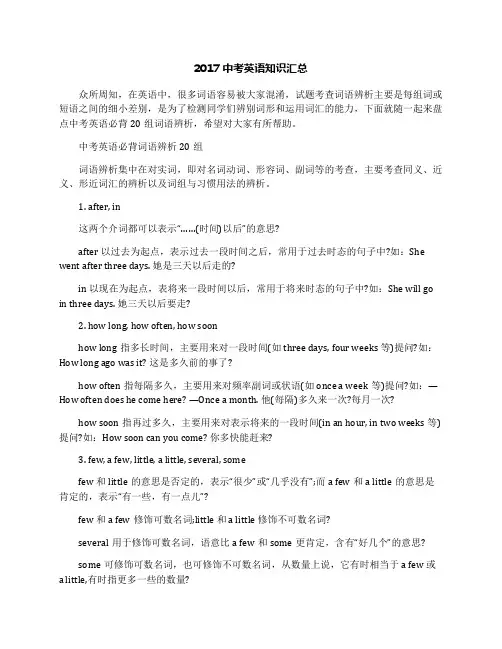
2017中考英语知识汇总众所周知,在英语中,很多词语容易被大家混淆,试题考查词语辨析主要是每组词或短语之间的细小差别,是为了检测同学们辨别词形和运用词汇的能力,下面就随一起来盘点中考英语必背20组词语辨析,希望对大家有所帮助。
中考英语必背词语辨析20组词语辨析集中在对实词,即对名词动词、形容词、副词等的考查,主要考查同义、近义、形近词汇的辨析以及词组与习惯用法的辨析。
1. after, in这两个介词都可以表示“……(时间)以后”的意思?after 以过去为起点,表示过去一段时间之后,常用于过去时态的句子中?如:She went after three days. 她是三天以后走的?in 以现在为起点,表将来一段时间以后,常用于将来时态的句子中?如:She will go in three days. 她三天以后要走?2. how long, how often, how soonhow long指多长时间,主要用来对一段时间(如three days, four weeks 等)提问?如:How long ago was it? 这是多久前的事了?how often指每隔多久,主要用来对频率副词或状语(如once a week等)提问?如:—How often does he come here? —Once a month. 他(每隔)多久来一次?每月一次?how soon指再过多久,主要用来对表示将来的一段时间(in an hour, in two weeks 等)提问?如:How soon can you come? 你多快能赶来?3. few, a few, little, a little, several, somefew 和little的意思是否定的,表示“很少”或“几乎没有”;而a few和a little的意思是肯定的,表示“有一些,有一点儿”?few 和 a few修饰可数名词;little 和 a little 修饰不可数名词?several用于修饰可数名词,语意比a few和some更肯定,含有“好几个”的意思?some可修饰可数名词,也可修饰不可数名词,从数量上说,它有时相当于a few 或a little,有时指更多一些的数量?4. the other, anotherthe other 指两个人或事物中的“另一个”,表示特指?如:We stood on one side of the road and they stood on the other. 我们站在街这边,他们站在那边?another着重于不定数目中的“另外一个”,表示泛指,所以常用来指至少三个中的一个?如:She has taken another of my books. 她已经拿了我的另外一本书?5. spend, take, cost, payspend的宾语通常是时间?金钱?在主动语态中,句子的主语必须是人,而且后面不能用动词不定式做它的宾语?如:She spent the whole evening in reading. 她把整个晚上用来读书?take常常用来指“花费”时间,句子的主语通常是表示事物的词语?如:How long will this job take you?你做这项工作要花多长时间?cost 指花费时间?金钱或力气等,只能用表示事物的词做主语,并且不能用于被动语态?如:How much does the jacket cost?这件夹克多少钱?pay 主要指主语(某人)买某物(或为某事)付多少钱(给某人)?如:I pay for my rooms by month. 我按月支付租金?6. speak, say, talk, tell这四个动词都有“说”的意思?speak的意思是“讲话;演讲”,着重指说话的动作,指开口说或连续不断地说,多用作不及物动词;用作及物动词时,其宾语是语言名称?如:He can speak Japanese. 他会说日语?say的意思是“说;讲”,一般用作及物动词,着重指说话的内容?它的宾语可以是名词?代词或直接引语等?如:She says, “Don’t draw on the wall!”她说:“别在墙上画画!”talk的意思是“说;讲;谈话”,与speak意义比较接近,但不如speak正式,着重强调两人之间的相互谈话,也可指单方面的谈话?如:She is talking with John in English。
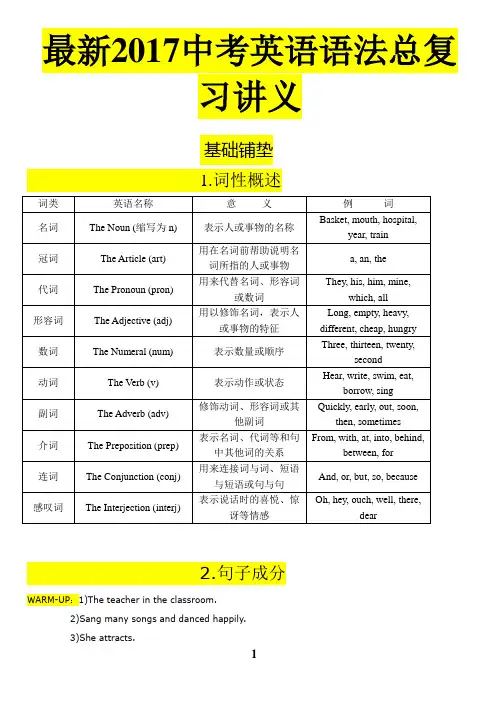
最新2017中考英语语法总复习讲义基础铺垫1.词性概述2.句子成分WARM-UP:1)The teacher in the classroom.2)Sang many songs and danced happily.3)She attracts.4)Many people living in the country.5)All the books on the desk over there.以上这些形式都不能构成英语句子。
英语句子(sentence)=主语+谓语(核心:主动词)I.八大成分的概念和构成1.主语(名词代词形):句子的主体,是谓语陈述,说明的对象。
If you want the rainbow you have to put up with the rain.不经历风雨,怎么见彩虹。
The secret of success is to start from scratch and keep on scratching.成功的秘诀在于从磨练开始,并要坚持不断磨练。
充当主语的形式:1)名词2)代词3)名词短语4)名词从句5)数词6)不定式7)-ing形式8)介词短语(少见)形式主语(名词从句,不定式,动名词)(见第六讲主语和宾语)2.谓语:表示主语的行为或进行的活动。
I have a dream.You don’t always want what you need, or need what you want.所需之物未必皆所欲,所欲未必皆所需。
谓语形式:动词(英语句子的灵魂)3.宾语:行为或活动的对象,接受者或受影响者。
You don’t find opportunities…you make them.你找不到机会。
你得去创造机会。
You probably won’t hear opportunity knock if your television is always on.如果你常开着电视,你就可能听不到机会的敲门声。
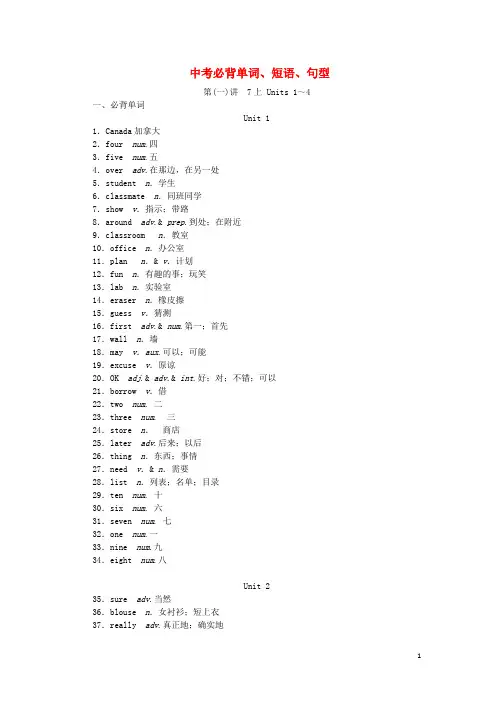
中考必背单词、短语、句型第(一)讲7上 Units 1~4 一、必背单词Unit 11.Canada加拿大2.four num.四3.five num.五4.over adv.在那边,在另一处5.student n.学生6.classmate n.同班同学7.show v.指示;带路8.around adv.& prep.到处;在附近9.classroom n.教室10.office n.办公室11.plan n.& v.计划12.fun n.有趣的事;玩笑13.lab n.实验室14.eraser n.橡皮擦15.guess v.猜测16.first adv.& num.第一;首先17.wall n.墙18.may v.aux.可以;可能19.excuse v.原谅20.OK adj.& adv.& int.好;对;不错;可以21.borrow v.借22.two num. 二23.three num. 三24.store n.商店25.later adv.后来;以后26.thing n.东西;事情27.need v.& n.需要28.list n.列表;名单;目录29.ten num. 十30.six num. 六31.seven num. 七32.one num.一33.nine num.九34.eight num.八Unit 235.sure adv.当然36.blouse n.女衬衫;短上衣37.really adv.真正地;确实地38.pink adj.& n.粉色(的)39.paint v.画;绘画;涂n.涂料,油漆40.mix v.混合;调配41.purple adj.& n.紫色(的)42.out adv.& prep.在外面;在……外面43.sky n.天空44.scarf n.围巾;头巾45.glove n.手套46.maybe adv.也许;大概47.just adv.恰恰;差不多;刚刚48.catch v.接住;抓住;染上(疾病) n.抓球(游戏) 49.ready adj.准备好的50.Tshirt n.短袖汗衫51.jacket n.夹克;上衣52.forget v.忘记53.hat n.帽子54.so adv. 非常;那么;很55.bright adj.明亮的;耀眼的56.world n.世界57.report n.& v.报告58.traditional adj.传统的;惯例的59.India 印度60.pretty adj.漂亮的;可爱的61.centre n.中心;中央62.Saturday n.星期六63.will v.aux. 将要64.pair n.双;对Unit 365.part n.部分66.feeling n.感觉,情感(常用作复数)67.robot n.机器人68.camera n.照相机69.smell v.嗅;闻起来70.finger n.手指(大拇指除外)71.player n.运动员;比赛者;选手72.homework n.家庭作业73.question n.问题74.sick adj.病的;生病的75.smile v.& n.微笑76.mean v.意思是adj.刻薄的;不善良的77.metre n.米78.bit n.小量;少量79.against prep.倚着,靠着;反对,违反80.tail n.尾巴;尾部81.upon prep.在……上面82.ground n.地面83.hurt adj.痛的;受伤的v.伤害;疼痛84.enough adj.& adv.足够的(地) 85.laugh v.笑86.matter n.问题87.headache n.头痛88.stomachache n.肚子痛;胃痛89.better adj.& adv.更好的(地) 90.medicine n.药91.different adj.不同的92.cute adj.逗人喜爱的;漂亮的93.twelve num. 十二94.thirteen num.十三95.funny adj. 有趣的;可笑的96.almost adv.几乎;差不多97.glass n.眼镜(glasses);玻璃,玻璃杯Unit 4 98.restaurant n.餐馆99.would v.aux.将;愿意100.salad n.色拉101.fifteen num.十五102.sugar n.糖103.delicious adj.美味的;可口的104.cup n.杯105.full adj.满的;充足的106.cookie n.饼干107.chocolate n.巧克力108.everything pron.一切事物109.meat n.肉110.job n.工作111.market n.市场112.grape n.葡萄113.carrot n.胡萝卜114.watermelon n.西瓜115.sweet adj.甜的116.pear n.梨117.order v.订购;点(菜) n.顺序118.fourteen num. 十四119.beef n.牛肉120.eleven num.十一121.dumpling n.饺子(常用复数形式) 122.something pron.某事;某物123.problem n.问题;难题124.menu n.菜单125.bottle n.瓶126.corner n.角;角落127.money n.钱128.fridge n.冰箱129.twenty num.二十130.pass v.传递;经过;路过131.away adv.离开(某处),在(某距离)处132.sandwich n.三明治133.only adv.仅仅;只二、必背短语1.be from... 来自……2.over there 在那里3.visiting student 访问生4.show...around 带领……参观5.have lessons 上课6.play sports 进行体育运动7.have fun 玩得愉快8.guessing game 猜谜游戏9.look at 看10.come out 出现11.just right 刚刚好,正好12.catch a cold (患)感冒13. ( be ) ready for... 准备去……14.go back 回去15.put on 穿上16.go well with 和……很相配;协调17.take...all out of 把所有的……取出18.look so pretty 看上去很漂亮19. in black and white 身穿黑白相间的衣服20.go shopping 去购物21.at the shopping centre 在购物中心22.a pair of 一双;一对23. play with 和……一起玩24.listen to 听……25.wave one's hand 挥手26.see red 火冒三丈27.a bit 有点儿;稍微28.stand against/upon 靠着……站29.see a doctor 看医生30.stay home 呆在家里31.have a rest 休息一下32.look cool/cute/funny/different看起来很酷/很可爱/很滑稽/不同33.have to 不得不34.be full of 充满35.write down 写下来36.corner store 便利店37.take down 拿下;取下38.pass around 分发;传送39.be away 不在;离开40.watch TV 看电视41.go back 回去42.get enough rest 得到充足的休息43.make noodles 做面条三、必背句型(情景交际)1.—What's your name? 你叫什么名字?—My name is...我叫……2.—How are you?你好吗?—I'm fine.And you?我很好。
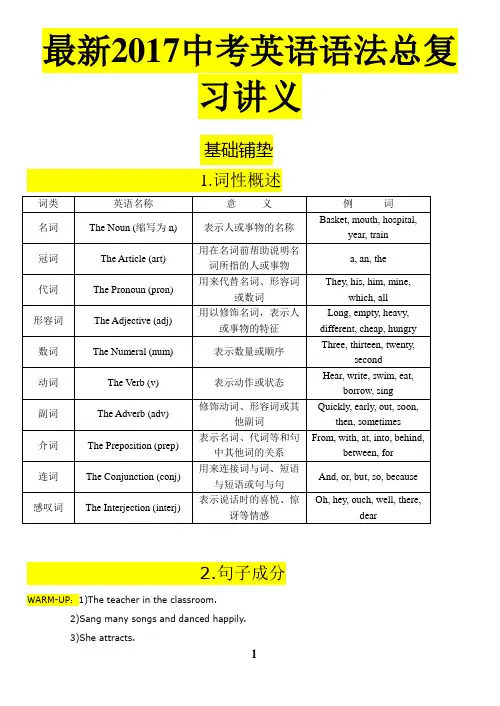
最新2017中考英语语法总复习讲义基础铺垫1.词性概述2.句子成分WARM-UP:1)The teacher in the classroom.2)Sang many songs and danced happily.3)She attracts.4)Many people living in the country.5)All the books on the desk over there.以上这些形式都不能构成英语句子。
英语句子(sentence)=主语+谓语(核心:主动词)I.八大成分的概念和构成1.主语(名词代词形):句子的主体,是谓语陈述,说明的对象。
If you want the rainbow you have to put up with the rain.不经历风雨,怎么见彩虹。
The secret of success is to start from scratch and keep on scratching.成功的秘诀在于从磨练开始,并要坚持不断磨练。
充当主语的形式:1)名词2)代词3)名词短语4)名词从句5)数词6)不定式7)-ing形式8)介词短语(少见)形式主语(名词从句,不定式,动名词)(见第六讲主语和宾语)2.谓语:表示主语的行为或进行的活动。
I have a dream.You don’t always want what you need, or need what you want.所需之物未必皆所欲,所欲未必皆所需。
谓语形式:动词(英语句子的灵魂)3.宾语:行为或活动的对象,接受者或受影响者。
You don’t find opportunities…you make them.你找不到机会。
你得去创造机会。
You probably won’t hear opportunity knock if your television is always on.如果你常开着电视,你就可能听不到机会的敲门声。
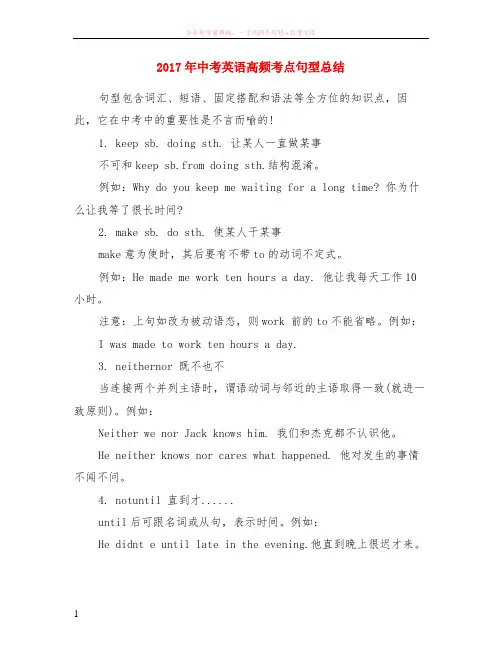
2017年中考英语高频考点句型总结句型包含词汇、短语、固定搭配和语法等全方位的知识点,因此,它在中考中的重要性是不言而喻的!1. keep sb. doing sth. 让某人一直做某事不可和keep sb.from doing sth.结构混淆。
例如:Why do you keep me waiting for a long time? 你为什么让我等了很长时间?2. make sb. do sth. 使某人干某事make意为使时,其后要有不带to的动词不定式。
例如:He made me work ten hours a day. 他让我每天工作10小时。
注意:上句如改为被动语态,则work 前的to不能省略。
例如:I was made to work ten hours a day.3. neithernor 既不也不当连接两个并列主语时,谓语动词与邻近的主语取得一致(就进一致原则)。
例如:Neither we nor Jack knows him. 我们和杰克都不认识他。
He neither knows nor cares what happened. 他对发生的事情不闻不问。
4. notuntil 直到才......until后可跟名词或从句,表示时间。
例如:He didnt e until late in the evening.他直到晚上很迟才来。
He didnt arrive until the game began. 直到比赛开始他才来。
5. sb. pays money for sth. 某人花钱买某物此句型主语是人。
例如:Ive already paid 2,000 yuan for the motor bike. 我已经花了20**元买这辆摩托车。
6. spend time/money on sth./(in)doing sth. 花费(时间、钱)在某事上/做某事其中in可以省略,通常主语为人。
新版译林初中英语教材重点短语、句型汇总2015年2月整理7A Unit 1 This is me!重点短语:1. love e-dogs 喜爱电子狗(7A. 6))2. look after 照顾,照料,照看(7A. 6)3. get to know 认识;逐渐了解(7A. 6)4. introduce yourself 介绍你自己(7A,. 6)5. welcome to 欢迎来到…(7A. 7)6. greet each other 相互打招呼(7A. 7)7. have short / long hair 长着短(长)发(7A. 8)8. love reading 喜爱阅读(7A. 8)9. like sports 喜欢体育运动(7A. 8)10. play football after school 课后打篮球(7A. 8)11. like music 喜欢音乐(7A. 8)12. be from Nanjing 来自南京(7A.8)13. be good at maths 擅长数学(7A. 8)14. talk about 谈论(7A. 11)15. be in Grade 7 在七年级(7A. 12)16. over there 在那边/里(7A. 12)17. love dancing 喜爱跳舞(7A. 13)18. be good at swimming 擅长游泳(7A. 13)19. at a new school 在新学校读书(7A. 14)20. have some new friends 有一些新朋友 (7A. 14)21. listen to the music 听音乐(7A. 15)22. fly kites 放风筝(7A. 15)23. play games 玩游戏(7A. 15)24. go home late 晚回家(7A. 15)25. come from Nanjing 来自南京(7A. 16)26. live with my family 和我家人住一起(7A. 16)27. wear glasses 戴着眼睛(7A. 16)28. have some new friends 有些新朋友(7A. 16) 重点句型:1. What’s your name? 你叫什么名字?(7A.6)2. How to look after your e-dog?怎样照看你的电子狗?(7A. 6)3. Nice /Glad to meet you. 见到你很高兴。
2017英语中考必考知识点背诵中考英语总复习既是查漏补缺的过程,也是一种学习的过程。
那么2017英语中考有哪些必考的知识点呢?接下来店铺为你整理了2017英语中考必考知识点背诵,一起来看看吧。
2017英语中考必考知识点:一般过去时与现在完成时的转换在现在完成时中,延续性动词能与表示一段时间的状语连用,瞬间动词却不能。
但是,可用別的表达方式:①瞬间动词用于“一段时间+ ago”的一般过去时的句型中;②瞬间动词可改成与之相对应的延续性动词及短语,与一段时间连用;③瞬间动词用于“It is + 一段时间 + since + 一般过去时”的句型中,表示“自从……以来有……时间”的意思,主句一般用it is来代替It has been;④瞬间动词用于“Some time has passed since + 一般过去时”的句型中。
例:① He joined the League two years ago.② He has been in the Lea gue for two years.③ It is two years since he joined the League.④ Two years has passed since he joined the League.2017英语中考必考知识点:this,that和it用法(1)this和that是指示代词,it是人称代词。
(2)距离说话人近的人或者物用this,距离说话人远的人或物用that。
如:This is a flower.这是一朵花。
(近处)That is a tree.那是一棵树。
(远处)(3)放在一起的两样东西,先说this,后说that。
如:This is a pen.That is a pencil.这是一支钢笔,那是一支铅笔。
(4)向别人介绍某人说This is...,不说That is...。
如:This is Helen.Helen,this isTom.这是海伦,海伦,这是汤姆。
专题⼗⾮谓语动词 ⼀、动词不定式 1、构成:动词不定式基本形式为: to+动词原形。
有些动词不定式不带to。
否定形式为:not (to)+动词原形。
2、功能及⽤法: (1)、⽤作主语 多数情况⽤it作形式主语,把真正的主语——动词不定式置于句末,特别是不定式短语较长时。
动词不定式作主语,谓语动词⽤第三⼈称单数形式。
如: For him, to talk with his mother is necessary.=It is necessary for him to talk with his mother. (2)、⽤作表语 动词不定式作表语,常说明主语的内容、性质、特征。
常可转换成主语。
如: The best way to improve your English is to join an English club.=To join an English club is the best way to improve your English. (3)、⽤作宾语 ★可以接带to的动词不定式作宾语的动词主要有:要求选择同意(ask, choose, agree),期望决定学习(expect, hope, decide, learn),宁可拒绝假装知道(prefer, refuse, pretend, know),希望想要愿意(wish, want/need, would like / love)等。
如: We decided to talk to some students. He prefers to eat white bread and rice. ★动词decide, know, learn, show, teach, tell...后可⽤“疑问词+to的不定式短语”作宾语,但why后⾯的不定式不带to。
如: Could you please tell me where to park my car? ★动词feel, find, make, think等后⾯,可以⽤it作形式宾语代替真正的宾语—动词不定式,句⼦结构是sb. feel / find / make / ...+ it+adj. / n.+to do...。
简单句、并列句和复合句考点一简单句1.简单句只包含一个主谓结构.2.五种简单句:1)主+谓. He comes at last.2)主+系+表. She is a teacher.The soup tastes nice.3)主+谓+宾. They reached the village.4)主+谓+间宾+直宾. He gave me a pen.5)主+谓+宾+宾补. I find that book very useful.考点二并列句并列句:两个或两个以上的简单句,用连词连接起来;常用的连接词有:1.表示顺承关系的:and, not only…but also不仅….而且….等;She ______ gave us a lot of advice, _______ helped us to overcome difficulties.Linda tried to become an excellent teacher, _____ at last she succeeded.2.表示选择关系和否定条件的有or还是,否则Do you want to leave now ____ would you rather set off laterWear your coat, ____ you’ll catch a cold.3.表示转折关系的有but, yet等;He is young, but he works hard.虽然他年轻,但工作努力;4.表示因果关系的有for, so 等;My leg hurts so I go to see a doctor. 我的腿疼,因此我去看医生;考点三主从复合句:宾语从句1.宾语从句的引导词1引导陈述句用 that在口语和非正式文体中常常省略He tells me that he is going shopping this Sunday.2 引导一般疑问句用if或whether.She asked me if\ whether she could join us. whether…or not3 引导特殊疑问句,要用原来的特殊疑问词;She asked them what they were doing.2.宾语从句的语序:要用陈述句语序;I want to know when the train left.3. 宾语从句的时态1主句是一般现在时,一般将来时或祈使句,宾语从句可根据实际需要选用各种时态;He tells us that he has been able to look after himself.(2)主句是过去时态,宾语从句应使用过去时的相应时态;They said that they had already finished the work.(3)如果宾语从句叙述的是客观事实、真理、自然现象等,不管主句用什么时态,从句都用一般现在时;He said that light travels faster than sound.3. 练习1She asked me, “Will you go to the cinema tomorrow”改为含宾语从句的复合句She asked me______ I ______ go to the cinema the next day.2 How lovely the dog is Can you tell me _____A. where did you get itB. where will you get itC. where you got it3 --- Can you tell me _____ your parents at home--- I often wash clothes and sweep the floor.A.how will you helpB. how you helpC. how will you helpD. howdo you help4 When I was young, my grandfather told me that the sun ______ rise in the east.考点四状语从句一、状语从句在复合句中作状语,修饰主句中的动词、形容词、副词等;1.地点状语从句地点状语从句通常由 where 引导;Put all the things _____they were.A. whereB. whenC. whoseD. which2.时间状语从句主句用将来时,从句用一般现在时时间状语从句的引导词有when, before, after, until, as soon as, since, while, as 等She was cooking when someone knock at the door.What will you do after you finished your homework3.条件状语从句在条件状语从句中,常用的引导词有if, unless等;If it dosen’t rain, I” ll go fishing.They will have a picnic unless it rains next Sunday.4.原因状语从句原因状语从句常用的引导词有because, as, since既然等He didn’t come because he was ill.Since we are students, we should study hard.Because 和so 不能在一个句子中同时使用;5. 结果状语从句结果状语从句主要由so…that…, such…that…引导;It’s so hot that we want to go swimming.That’s such an interesting story that everybody likes it.So… that…与简单句之间的句型转换1)that后的句子是否定句,常用too…to进行转换;He is so young that he can’t go to school. he is too young to go to school.2)that后的句子是肯定句;常用enough to 进行转换;The shirt was so cheap that he bought it. the shirt was cheap enough for him to buy.6.目的状语从句目的状语从句常用的引导词有so that, in order that 等 in order to 简单句Please say it in a loud voice so that everyone can hear it.He works harder in order that he can go to a good college.7. 让步状语从句引导词有though, although, even if, even though尽管等;He often helps others though\ although he is not rich.They will stand by you even if you don’t succeed.Though, although与but 不能同时出现在一个句子中8.比较状语从句比较状语从句由than, as…as…, not as\so… as等引导;比较级He is more outgoing than I.He ran as fast as Mike.二、练习1. It’s quite common in Britain to say “thank you”to the drivers _____ people get off the bus.a. afterb. sincec. untild. when2. The art club is for members only. You can’t go in ____you are a member.a. unlessb. becausec. ifd. though3. Now many parents send their children to foreign countries, _____ they want them to get a better education.a. untilb. thoughc. because4. ---- What would some students like to do after finishing their education---- They would like to start to work_______ they needn’t depend on their parents completely.a. as soon asb. so thatc. befored. while考点五定语从句修饰某一名词或代词的从句叫定语从句;被定语从句修饰的词叫先行词,引导定语从句的词叫关系词关系代词和关系副词;1.关系代词的基本用法The man __________spoke at the meeting is from Hong Kong. 指人作主语The building ___________is being built will be used as a hospital.指物作主语I visited a scientist _______ name is known all over the world. 指人作定语2. 关系代词特殊用法1当关系代词在从句中作主语时,从句的谓语动词要与先行词保持一致;He is one of the boys who ______ like playing football.He is the only one of the boys who________ like playing football.2 通常以下四种情况关系代词只能用that而不能用which.1 先行词为all, much, something, everything, nothing, little, none, the one 等不定代词时2先行词被形容词最高级修饰时;3当先行词被the only, the very, the just等修饰时;4先行词中既有人又有物时;3. 关系副词的基本用法;1 when 在句中作状语,表示时间;2 where 在句中作状语,表示地点;.3 why 在句中作状语,表示原因;He remembers the day _______ he joined the League.This is the reason_______ he is late today.This is the place _______ Lu Xun was born.1. 2011泰安--- _______do you read English newspapers---I read China Daily every day.A. How longB. How soonC. How oftenD. How far2.2011抚州John had a short walk after lunch, _______A. did heB. didn't heC. had heD. hadn't he3.2011宁波--- _______do you have an Art Festival in your school---Once a year.A. How longB. How oftenC. How farD. How soon4.2011安徽省If you want to go to see the movie this evening, so _______I.A. doB. amC. willD. should5.2011长沙 _______tall the girl isA. HowB. HowaC. WhatD. What a6.2011长沙 _______ call me Mimi It's my cat's name.A. NotB. Didn'tC. Doesn'tD. Don't7.2011长沙They went to the park yesterday,_______A. don't theyB. didn't theyC. aren't theyD. can't they8.2011福州---Li Mei usually helps others, _______---Yes, she is kind-hearted.A. does sheB. is sheC. doesn't she9.2011眉山There _______an English party in our school tomorrow evening.A. haveB. will haveC. is going to haveD. will be10. 2011济南--- _______a year does your school have sports meetings---Twice a year.A. How oftenB. How soonC. How longD. How many times11. 2011泰州---I have changed my job.---_______.A. So do IB. So have IC. So I doD. So I have12. 2011济南Mike learns a lot about Internet. And _______.A. I don't, eitherB. so do IC. so am I am, too13. 2011眉山Jim never goes to the movies on Saturday, _______A. does JimB. doesn't JimC. doesn't heD. does he14. 2011玉州You've just finished your listening exam Please getyourself ready for the next part, _______A. shall weB. will youC. do youD. are you15. 2011眉山--- _______the weather like last Monday---It was sunny.A. How wasB. What'sC. What wasD. How is16. 2011潍坊_______great scientist Qian Xuesen isA. HowB. HowaC. WhatD. What a17. 2011眉山--- _______do you visit your grandparents---Once a month.A. How soonB. How longC. How muchD. How often18. 2011内江--- _______ do you speak English so well---Because I practice it with my partner every day.A. WhyB. WhenC. Who19. 2011泉州---We'll go to Qing Yuan Mountain tomorrow. Why _______join us---That's a good idea.A. notB. don'tC. can'tD. didn't20. 2011泉州There is little milk in the glass, _______A. is thereB. isn't thereC. isn't itD. does it21. 2011肇庆The students in Class Two played basketball against ClassOne yesterday,_____A. did theyB. didn't theyC. weren't they22. 2011宁波---What a new computer Can you tell me_______---Just the day before yesterday.A. how much you paid for itB. how much did you pay for itC. when you bought itD. when did you buy it23. 2011泰安---Tom wants to know if you will have a picnic tomorrow.---Yes. But if it _______, we'll play chess instead.A. will rainB. rainedC. is rainingD. rains24. 2011烟台---Do you know this dictionary belongs to---Let me see. Oh, it's_______.A. who does; mineB. who; meC. whose; mineD. who; mine25. 2011杭州Franklin told them all _______to be in Britain again.A. he was how happyB. how happy he wasC. how was he happyD. he was happy how26. 2011湖州---What kind of movies do you like---I like the movies_______ are about Chinese history.A. whoB. whomC. whoseD. that27. 2011丽水---Do you know _______---Sorry, I don't have a watch.A. whose watch this isB. whose watch is thisC. what time it isD. what time is it28. 2011重庆The woman asked the policeman where _______.A. the post office isB. the post office wasC. is the post officeD. was the post office29. 2011泰安---Can you guess_______ the new schoolbag yesterday.----Sorry, I've no idea.A. how much did he pay forB. how much he spentC how much he paid for D. how much did he spend30. 2011杭州Who is the man_______ is reading a book over thereA. thatB. whichC. whoseD. what31. 2011湖州---Do you know_______---Next Sunday.A. what they will doB. where they will doC. when they will come hereD. who they will meet32. 2011长沙---Can you tell me why_______---Because I want to help the people there.A. do you go to Tibet西藏B. did you go to TibetC are you going to Tibet D. you are going to Tibet33. 2011浙江省---Linda, could you tell me _______---He is an actor.A. what he doesB. what does he doC where he works D. where does he work34. 2011福州---Could you tell me _______---Sure. The day after tomorrow.A. when will you leave for the U.S.A.B. when Mr. Lee will comeC when your father returned35. 2011济南He asked me_______.A. who did kick the first goal in the World CupB. when was the A. PEC meeting heldC when China became a member of the WTOD. where will the 2008 Olympics be held36. 2011玉州Jane is one of the students in the class _______ have everbeen to China.A. whoB. whoseC. whichD. whom37. 2011济宁Can you tell me _______after this examA. what you didB. what did you doC. what will you doD. what you will do38. 2011苏州---Can you tell me how many colours _______ in a rainbow---SevenA. there areB. are thereC. they areD. are they39. 2011潍坊I can't understand _______Apple's iPad 2.A. why are they so mad aboutB. why they are so mad aboutC. how are they so mad aboutD. how they are so mad a。
中考简单句专项一、简单句的分类二、陈述句——用以肯定或否定一件事情或看法的叙述性句子叫陈述句。
1、陈述句肯定式的正常语序是:++。
2、陈述句否定式的结构(1)完全否定:常用no,none,little,not,nobody,nothing,neither,nor,never,等词表示否定。
I had never seen such a good match before.Many could neither read nor write.(2)部分否定:用hardly,seldom,few,little等词,或者not和both、all、each、every、always等连用时表示部分否定。
Not all students come to school by bus.三、疑问句1. 一般疑问句1)以be动词开头的疑问句Is she a nurse?2)以助动词开头的疑问句Do you want to study English?3)以情态动词开头的疑问句Can they do it for us?2、特殊疑问句特殊疑问句是以疑问代词(who, whom, what, which, whose)、或疑问副词(when, where, how, why)开头。
1)特殊疑问句的构成如果疑问代词是问句的主语或以“疑问形容词+名词”为问句的主语,这个问句就用正常的陈述句语序。
Who is your teacher?Which team won the championship?疑问句除作问句的主语或主语的定语以外,其余情况一律用“疑问词+一般疑问句”的语序。
Why does he often go there?What did he tell you?3、选择疑问句选择疑问句是要求从所提出的两个或多个项目中选择一个答案。
选择问句有两种类型:1)类似一般问句的类型,即“一般问句+or+省略的一般问句”。
Is it right or wrong?Do you want to go by bus or by train?2)类似特殊疑问句的类型,即“特殊疑问句+or+省略的特殊疑问句”。
2017年中考英语语法简单句考点【简单句命题趋势与预测】根据对简单句全国各地试题的分析可知,今后该部分将是重点考查点之一。
其考查重点为:1、简单句的反意疑问句2、复合句的反意疑问句3、祈使句的反意疑问句【考点诠释】一、对疑问句的考查一___________do you usually fly kites?一In the park.[北京市]A Why B.How C WhenD.Where[答案]D。
[解析]考查疑问副词。
回答:“在公园”可知上句一定是“你通常在哪里放风筝?”park表地方,故选D。
---The blue jacket looks nice on you. _________is it?---It's 50 dollars. [吉林省]A. How manyB. How muchC. How longD. How often [答案]B。
[解析] how many多少(后面加可数名词复数);how tong 多久;how often多久一次(提问频率)。
由关键信息50 dollars(50美元)可知选B。
how much多少钱。
---________?---He is tall. [陕西省]A. How is heB. What does he likeC. What is heD. What does he look like[答案]D。
[解析] 根据后文“他高”,其问句必然是D项“他长得怎么样”,因为A项表示“他好吗”;B项表示“他喜欢什么”;C项表示“他是干什么的”。
–Sandy ,_________are you going for vacation?--To Hainan Island. I prefer lying on the beach. [太原市]A. whereB. whenC. what [答案]A。
[解析] 本题考查特殊疑问词的用法。
由答语"To Hainan Island”可以推断问句中的特殊疑问词应该是表示地点的where。
而when是询问时间,what是“什么”均不合题意。
-- ________will your Dad be back from Dalian?--In a week, I think.[07吉林省]A. How longB. How soonC. How oftenD. How farB[解析] in a week"一周以后”,in+时间段,用how soon提问。
故能选B。
--______ are you talking about?-- The Olympic Games in Beijing.A. WhatB. WhomC. HowD. Where (杭州)解析:答案为A。
题干第二句承前省略了主语和谓语,该句的完整形式是We are talking about the Olympic Games in Beijing.同学们要注意,the Olympic Games in Beijing句中的in Beijing这个介词短语是做后置定语修饰the Olympic Games,正确的理解是“北京的奥运会”,而不是“在北京谈论奥运会”,因此选项A才是正确答案。
一、对反意疑问句的考查【考例】The air is fresh outside. Let's go and take a walk, _________?[昆明市]A. will youB. shall weC. don't youD. aren't you[答案]B。
[解析] 这是一个let's引导的祈使句,表示建议,这样的句子在构成反意疑问句时,在句末加shall we,所以B项正确。
There is some water in that bottle, isn't ________?[07兰州市]A. thereB. itC. that[答案]A。
[解析]考查反意疑问句。
反意疑问句不同于一般疑问句和特殊疑问句,它由两部分组成,前面部分为陈述句,后一部分为简短问句。
——Few well-known singers came to the concert,did they?一__________.Such as Andy Lau,Jay Chou and Kristy Zhang.[黄冈市]A.No,they didn't B.Yes,they did C No,they did D.Yes,they didn't[答案]B。
[解析] 考查反意疑问句。
在这类结构的句中,若前一部分有few、never、hardly等表示否定的词。
后一部分要用肯定形式。
回答时,只要事实是肯定的就用Yes,只要事实是否定的就用No。
二、对祈使句的考查祈使句是简单句中的一种类型,通常用来表示命令、请求、禁止、建议、警告等语气,在口语中十分常用。
祈使句的用法是近几年来各类中考试卷中常考的热点。
现结合高考题,对几种考点作以归纳。
【考例】--_________kind girl Nancy is!--Yes, she is always ready to help others. [南京市]A. WhatB. What aC. HowD. How a[答案]B。
[解析]考查感叹句。
感叹句用how和what引导,what 修饰名词,how修饰形容词、副词和动词。
12.---It's reported that the 29th Olympic torch(奥运火炬)is going to travel to 135 cities around the world.---__ exciting the news is! And it will arrive at the opening ceremony (开幕式)on August 8th,2008. [哈尔滨市]A. WhatB. HowC. What an [答案]B。
[解析]考查感叹句,感叹句一般用how或what引导。
how修饰形容词、副词;what修饰名词。
13. ________tall the boy is! He can play volleyball very well[长沙市]A. HowB. What aC. What[答案]A。
[解析]考查感叹句用how和what引导,what修饰名词,how修饰形容词、副词和动词。
14. --I hear that an old couple are traveling around China by bike.--Oh, ___________ long way on their bicycles! They are so great. [河南省]A. what aB. howC. whatD. how a[答案]A 。
[解析]way是名词,故用what引导感叹旬,而way又是可数名词单数,因此要在前面加不定冠词a,所以A是正确答案。
15.一一____terrible weather it is!——The radio says that it'll get ____later in the day|[扬州市] A.What a;bad B What;worse C.HOW;bad D.How a:worse[答案]B 。
[解析]terrible weather是一个名词性词组,所以应由what来引导这个感叹句,由此可否定C项与D项,同时,weather 是不可数名词,前面不能加冠词a,可否定A项。
从另一个角度来看,由句意也可判断最后一句应是比较级的句子。
【语法回顾】简单句通常只由一个主语(或并列主语)和一个谓语(或并列谓语)构成。
简单句一般分为陈述句、疑问句、感叹句和祈使句四种。
陈述句用以肯定或否定一件事情或看法的叙述性句子叫陈述句。
句末用句号,读时用降调。
1、陈述句肯定式的正常语序是主语位于谓语前。
例如:We'll meet again tomorrow .我们明天再见面。
Last week we started our trip across this country.上星期我们开始了横跨这个国家的旅行。
2、陈述句否定式的结构(1)在连系动词be,实义动词have,助动词或情态动词后加not,never......等否定词构成否定式。
例如:We mustn't waste any more time.我们决不能在浪费时间了。
I've never been so afraid in all my life.在我一生中,我从来没有这么害怕过。
当谓语动词是have“有”时,其否定式可以有两种:Students usually have not their P.E. lessons on Monday.学生们通常在星期一没有体育课。
Students don't usually have not their P.E. lessons on Monday.(2)在行为动词前加do (does,did)not(句中的行为动词应用原形)构成否定式。
例如:I didn't find Chinese easy at first. 起初,我发现中文不容易。
Sorry, I don't know much about him.对不起,我对他不大了解。
He doesn't like American movies very much.他很不喜欢美国电影。
(3)句中若有no,none,little,not,nobody,nothing,neither,nor,never,hardly,scarcely等否定意义的词,可构成陈述句的否定式,同时不能再用not。
例如:I had never seen such a good match before that day! 在那天以前,我从来没有看过这么精彩的比赛!Many of the country people could neither read nor write.许多国家的人既不会写也不会读。
There was no music or dialogue.没有音乐或者对话。
He little knows what may happen.他一点也不知道可能要发生什么。
(4)在have 作“有”解时的否定结构中,如用not 则在宾语前常有a (an),any,many,much等词;如用no,则不用这些词而应紧跟名词。
have 不作“有”解时,通常按行为动词构成否定式。